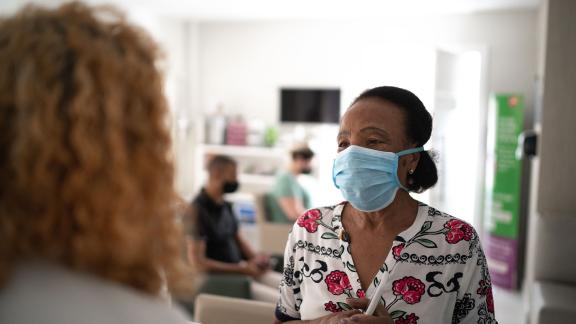A commitment to access, continuity of care and personalised care

Warrington Innovation Network PCN
In Warrington, respiratory conditions including COPD exacerbations are the largest driver of A&E attendances. Warrington Innovation Network PCN is currently running a pilot programme to support patients with hypertension or COPD in order to minimise their risk of hospital admission and significant health events such as heart attack or stroke. The programme focuses on tailored, proactive intervention and combining medical and holistic support for each patient. Seven practices are involved in the project, rolled out across the entire PCN.
By proactively monitoring and managing COPD and hypertension patients, they can receive increased support when they need it, which is tailored to each patient’s need rather than in line with a universal treatment programme. Professionals can spot when patients condition starts to deteriorate – often before they’ve spotted it themselves – enabling rapid treatment and quicker recovery.
For both COPD and hypertension, the PCN is taking a hybrid approach that combines remote care with in-person support as needed. For COPD, a risk stratification tool created by UCL Partners enables the PCN to direct care towards the patients who most need it, so care is delivered where it is effective instead of on a ‘fair shares’ basis. Hypertension patients are identified exclusively through readings from remote monitoring. The team aims to identify patients with hypertension who also would benefit from closer intervention and risk stratifying.
Once identified, patients are invited to engage in a range of remote monitoring such as health kiosks, funded in practices by GP transformational funding, where patients can take their own blood pressure, pulse and BMI. Patients are also offered the Etc Health app, which enables them to upload readings to be viewed by clinical teams. The app and kiosks both feed directly into a patient’s record and the clinical team identifies patients whose readings indicate that they would benefit from an intervention.
Through a combination of holistic and medication changes, the PCN supports these patients to achieve good blood pressure control. The aim is to engage more effectively with patients who previously have been harder to reach, as the team can see when readings are submitted and follow up on any gaps. Harder-to-reach patients are more likely to experience greater health inequalities and have poorer outcomes. The tailored interventions help with adherence and goal setting and are a significant driver for behavioural change.
Patients are pre-emptively booked into follow-up appointments with a prescribing nurse or a clinical pharmacist so that changes can be made to their medication as necessary. The patient can also have sessions with a healthcare assistant or pharmacy technician, who will work through lifestyle advice. The PCN has also collaborated with the local authority to provide patients who begin to deteriorate with additional support from social prescribers and signposting. This support has proved very effective and has identified a number of inequalities issues, including COPD patients experiencing fuel poverty which is exacerbating their condition. The team hopes to support patients in addressing these issues before winter 2023 to ensure that health inequalities are having a minimal impact on their long-term health.
Outcomes
Feedback from patients has been overwhelmingly positive. They have benefitted from proactive care and feel safe and supported in their medical condition. For hypertension, the team has had a significant positive impact on patients’ management. It is anticipated that over the next six to 12 months, the project will prevent ten heart attacks and 20 strokes, with reduced hospital admissions.
The remote monitoring has been very effective and enabled the team to offer intensive management with micro-interventions when patients become unwell, and react early before a serious decline can occur. The project team can spot missed readings and remind the patient to upload a new one and can ask how medication changes are being tolerated, involving the patient in their own care and ensuring high levels of continuity.
For COPD, the PCN has registered about 100 patients across the footprint who have a diagnosis and are at risk of hospital admission. The project is on course to see at least 1,000 patients, and there is a hope to see even more. This will be a mixture of more acute COPD patients and patients with a known diagnosis of hypertension in whom treatment has yet to be fully optimised. This improves quality of life, helps patients feel supported, and reduces unplanned attendance at both the GP surgery and hospital.
Finally, the PCN has made a start on the long process of changing the culture of health across the system. Instead of patients seeking care when they feel unwell, they will be contacted before they become ill. This is the power of collaborative working and digital technology to reduce health inequalities.



